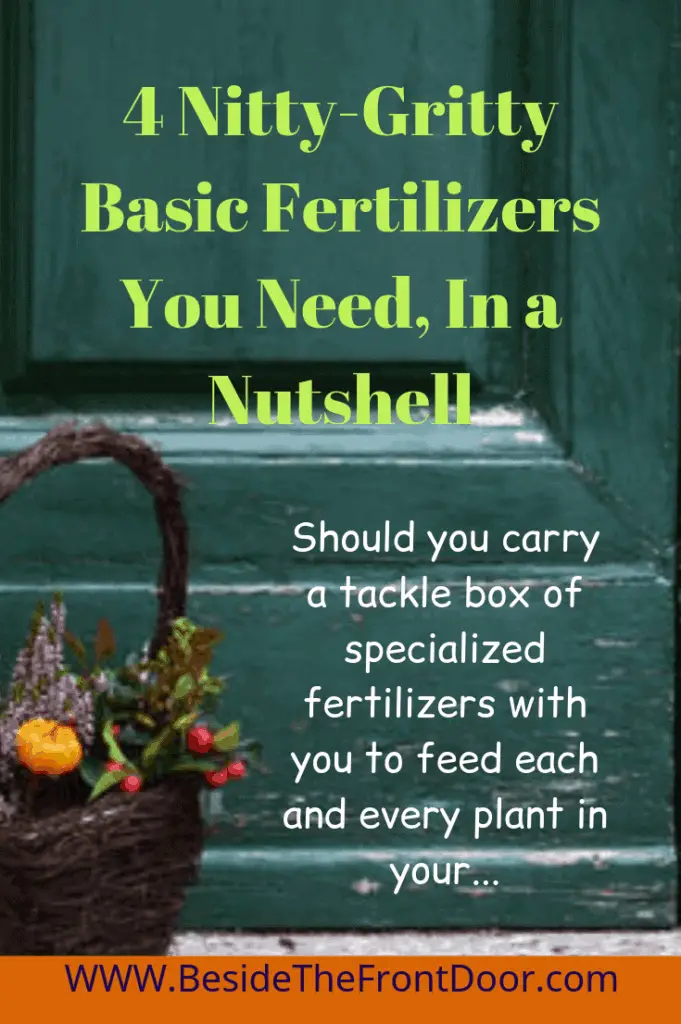When you walk down the aisles of a big box store, or internet search for fertilizers, the choices and options seem endless. Need fertilizer for your tomatoes? Peppers? Roses? Flowers? Trees? Azaleas? Japanese maples? Lawn? Yes, there is a fertilizer for that. But do you need a different and specialized fertilizer for each and every different plant that you have? Should you carry a tackle box of specialized fertilizers with you to feed each and every plant in your garden and landscape a very specialized and specific fertilizer? What if your Japanese maples and azaleas are growing beside each other, how do you keep them feed with only their fertilizer?
I bet you are sensing a theme.
Don’t overcomplicate it!
Mother Nature does not feed each of these plants separately. Yes, there are specific requirements for different situations, but don’t go diving down that rabbit hole (unless you want to).
The 4 basic fertilizers you need in your life are:
- Grass Fertilizer
- General Purpose Granular Fertilizer
- Acid Lover’s Fertilizer
- Bloom Boosting Water Soluble Fertilizer
These can be either organic or conventional. Yes, you can get more specific than that, and that is fine, but you don’t NEED to, 99% of what you are going to grow, you can cover with these four. Yes, you can use several individual components to make your own formulations of these four. Organics are a particularly easy fertilizer category to tweak, specialize, and make your own favorite.
Yes, you have heard about NPK, the nutrients listed on every fertilizer. A quick run-down:
N is nitrogen, the major nutrient needed for top green leafy growth.
P is phosphorus, the major nutrient for roots and flowers.
K is potassium, for general, overall, plant health.
In natural habitats, different pH and nutrient levels exist. Different plants have been evolving and growing to fit these specific niche areas over the millennia.
Fit your plant choices to your growing area. If you want gardening to be easy. Find out what type of conditions you have, soil, sun, etc. Click here to take a peek at a guide to judge your sun conditions, THEN pick from the plants that like those choices. Do Not fall in love with a plant and try and try again to ask it to grow in conditions it is not evolved to and determine that is just too hard to grow, or is finicky. Location, location, location. But, I digress, I’ll go more in-depth into this in another article….
Grass Fertilizer, use it only on your lawn. It is too high in nitrogen to work well on anything else. Great for lush green grass. For flowering perennials, shrubs, trees, and annuals, grass fertilizer encourages the plant to push lush green growth, at the expense of flowers. Also, the growth can be too fast and lush for the strength and health of your trees and shrubs. Yes, I know you want your trees and shrubs to grow fast. Faster does not always mean better. Plant growth is on a bell curve, you want to encourage your plants to grow, making sure they have everything they need as far as not running short on nutrients, but you do not want to flog them into growing faster than is healthy for them. The growth would be weak and susceptible to disease.
General Purpose Granular Fertilizers. Liquid fertilizers are just that, soluble in liquid. Water. Rain. So every time you irrigate or it rains, it washes the fertilizer out of the section of soil where your plant roots can reach it. This is why you use granular fertilizers, slower release, so every time it rains, more is released into your root zone, slowly. This is not a timed release, they are specifically timed to release a certain amount as the coating breaks down, in months, whereas I am talking years to break down completely. Similar to the way things break down in nature if you are using an organic granular.
Acid Lovers Fertilizer. Most fertilizers either are stable or slowly raise the pH of your soil, it has to do with soil chemistry, and which nitrogen source was used, and a million other factors. If you, or more specifically your plants, need more acidic soil, get specifically an acid lover fertilizer. If the soil pH is wrong for the plants you are growing, the nutrients for plant growth and health will not be available to the plant. I am not talking about if the nutrients are present in the soil, available to the plant. The deeper you delve into soils, the more chemistry you will encounter. So, to keep this in a nutshell, yes, you are probably growing some things that prefer more acid soil. Meaning that pH level allows the nutrient levels to be available that the plant is adapted to. For a good explanation of this, albeit more technical, follow this link to Crop Nutrition, Soil Acidity.
Bloom Boosting Water Soluble Fertilizer. I recommend this for your container-grown, flowering plants. Growing in containers, you need to water often, often daily, or even more, all that watering quickly washes nutrients out of the soil. Water-soluble fertilizer is quickly available to your plants, allowing them to uptake the macronutrients they need before it all washes out with the draining water. Bloom boosting has a higher proportion of phosphorus, the nutrient your plant needs to flower, and keep on flowering to its fullest potential.
Related Questions:
What time of day should I fertilize my plants?
What time of day depends on what type of fertilizer you are using. Liquid fertilizers should be applied in the morning when possible. Also, apply when the plant is moist and NOT wilted. If the plant is wilted, water, wait for an hour or two, then fertilize.
Best practices are to let the plants’ leaves and stems dry before night, to reduce the incidence of diseases such as powdery mildew and black spot. This applies to liquid fertilizing as well as watering.
If liquid fertilizers are applied midday. There is the chance of dripping onto leaves, which could dry and concentrate the fertilizer salts on the leaves, which may cause damage.
On the small home scale, it is not significant enough possibility to be concerned about what time of day to fertilize. Dry fertilizers do not have a concern about what time of day, they will be stable and will not become available until wet, by either rain or irrigation for example.
How do I know when my plants need to be fertilized?
Before you look at your plants, think they are not doing as well as you would like, and throw fertilizer at them, you have to do your homework. To know if your plants need fertilizer for sure you need to do a soil test and a leaf nutrient analysis test. Most of us do not need to be that scientific. Answer the questions of, Is your plant in the ground or in a container, what type of soil is it in? When and what types of fertilizer have been used before? Are there any other signs of a nutrient deficiency? How much rain or irrigation has this plant received? What type of plant is it? Some are heavy feeders and others not so much. The best place to start is to research your type of plant, in type soil conditions, and fertilizer needs. A general guide will be found. If you have clay soils, you will need to fertilize less, sandy soils will need to be fertilized more often. Here is a link to a good guide that explains the variables.
Not sure about where to start, contact your local Agricultural Extension office. Here is a link to find yours. Often online there will be local resources to guide you, or call or write to them and ask, they will be happy to help guide you with the best advice- local advice! There are SO many variables, you need local advice to start for this question.
Here is a link to a short article about how to know you are overfertilizing your plants.
-
Water New Trees & Flowers – Volume, Frequency & Best Tips
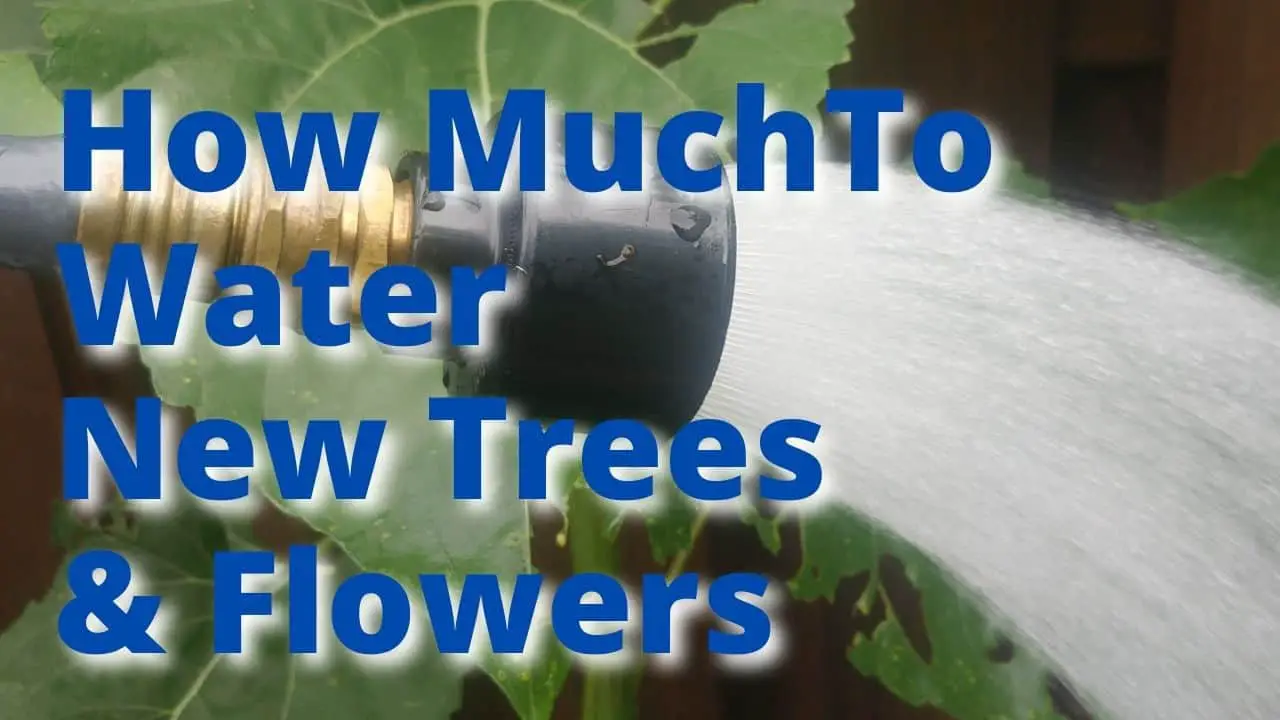
After transplanting trees, shrubs, annuals, and perennials, into your landscape, watering will be first on your list of concerns. Getting this right will solve the number 1 reason why plants
-
Should You Buy It? Cercis canadensis ‘Flame Thrower’ Redbud
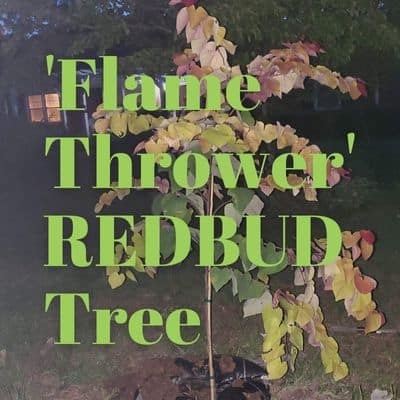
If you will take the time to make sure this tree remains vigorous, it is well worth it! A stellar new tree with loads of color and interest even when
-
Japanese Maples W/ Unusual Peach Color on New Leaves In The Spring
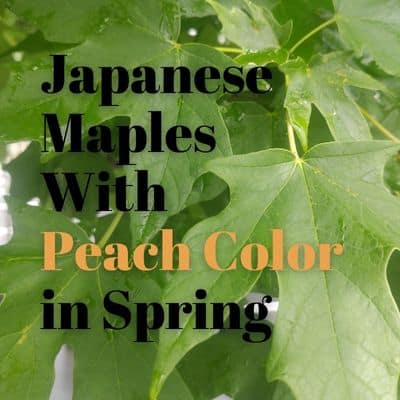
ACER CIRCINATUM ‘SUNNY SISTER’ 6-8 6-7 peach lt green yellow/ orange Amoenum upright ACER ELEGANTULUM X PALMATUM ‘JOHNNIE’S GIANT’ 6-9 FAST 15 Peach dk green yellow/ orange Matsumurae upright ACER
-
What Japanese Maples Are Orange In The Fall?
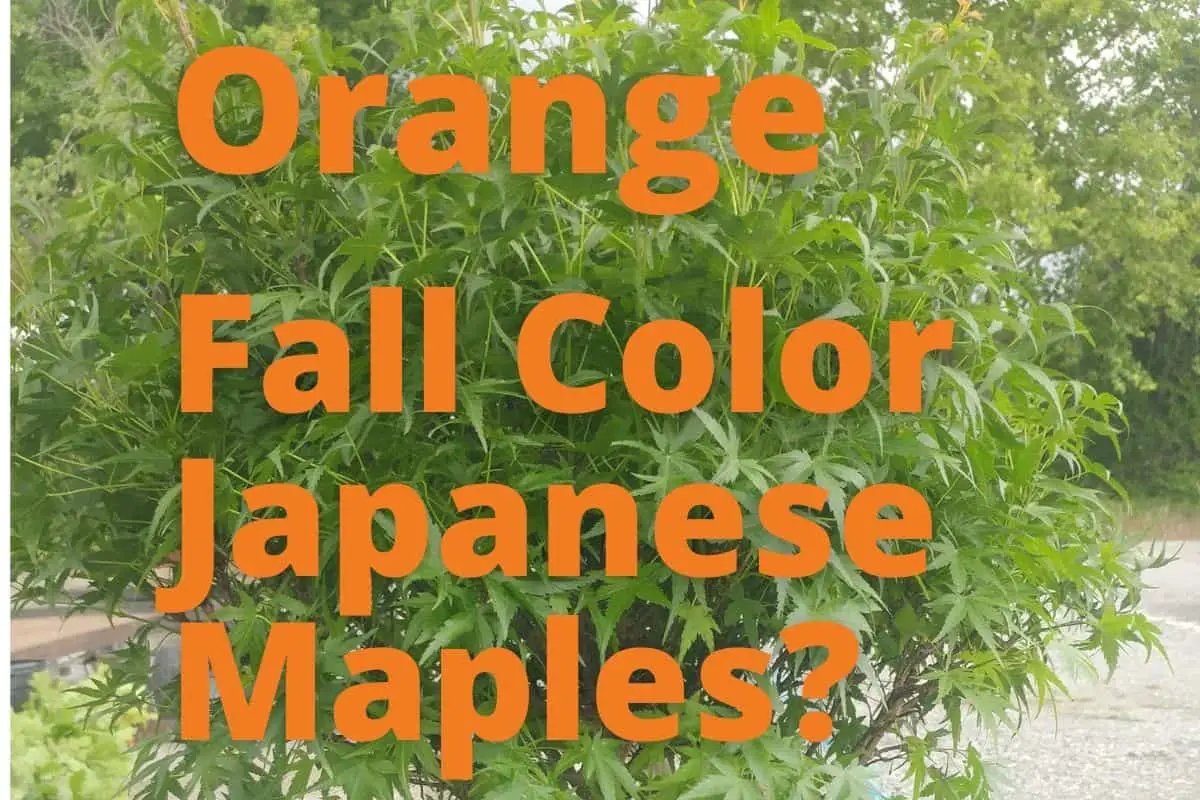
Latin name zones height 10-15 yrs spring color summer color fall color leaf type tree shape ACER JAPONICUM ‘EMMETT’S PUMPKIN’ FULL MOON 5-9 12-15 org/over green dark green orange Palmatum
